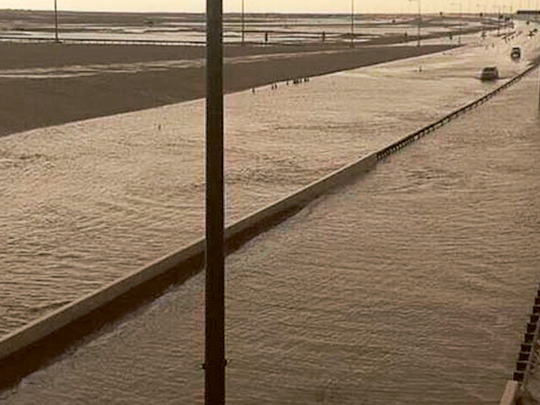
Doha: A heavy downpour earlier this month that caused flooding on one of the major highways in Qatar has set off a heated public debate over the competence of the Public Works Authority (Ashghal), the state company in charge of construction and maintenance of infrastructure and roads.
Authorities had to close the Dukhan highway that links Doha to Dukhan, a key industrial hub and a popular destination for campers and beachgoers, as the drainage network failed to soak the large amounts of rainfall.
The fact that a similar incident last year caused flooding and temporary closure of the Salwa Road, which had been newly opened, had not been forgotten and Qatar residents and media have now gone public with their anger at Ashghal.
Qatari media pointed fingers at the state-owned company, blaming it for the recurring episode and called for swift and firm action against Ashghal-contracted companies for failing to comply with technical requirements, leaving commuters with vulnerable highways that have become a source of concern ahead of winter months every year.
An editorial in daily newspaper Al Arab said Ashghal has become a reference for negligence in the country, blaming the company for the flooding of a road that “cost nearly QR 1 billion” to construct.
People took to social media and, on Twitter, the Arabic hashtag “Qatar doesn’t deserve to drown” was the platform where over 1,500 tweets offered a glimpse of the public outrage and discontent with Ashghal’s handling of the matter. The hashtag itself is a play on Ashghal’s slogan, “Qatar Deserves the Best.”
Others ensured the event was well-documented as they snapped photos of the flooding on the Dukhan highway and shared it on different social networks.
“People are paying the price for technical mistakes even though Ashghal’s former director had pledged that mistakes in Salwa Road would not happen again,” Twitter user Hamoud Al Khaldi wrote.
While people’s reactions were critical of the event, some found a way for humour. “Instead of holding cycling races, we should host the world rowing championship,” joked Ahmad Al Mohannadi on the microblogging network.
The hours-long closure of Dukhan highway took its toll also on campers and beachgoers, especially since the rainfall occurred on a Friday. “I was going to Dukhan for a night at the beach with a group of my friends but we had to cancel the planned trip after we learned about the closure,” said Fouad Ali, an expat who has lived in Qatar for three years.
The sanctioning of a Saudi contracting company involved in the crane accident that killed scores in Makkah’s Grand Mosque last week was also brought to the forefront of the row against Ashghal as some asked the authority for similar action against companies that were in charge of planning and executing faulty roads.
Daily newspaper Al Raya said the Saudi decision to ban the company from future projects and bar its top officials from travelling pending criminal investigation is “a lesson for Ashghal in taking firm action against companies that are found to be at fault in executing a project.”
Amid severe criticism from the media and the public, the under-fire Ashghal issued a statement citing “heavy and unprecedented rain that fell in very brief period of time” as the reason behind the flooding. It added that tanks and reservoirs collecting rainwater were “unable to drain the water” because the rain “exceeded the network’s capacity and design criteria”.
The statement, however, did little if anything at all to appease the public, and Ashghal’s defiance and failure to take any responsibility for the repeated flooding or to blame the executing companies became the subject of further public resentment.
In the front page of its Thursday edition, Al Raya criticised Ashghal’s statement in an editorial and decried the absence of any mention of an investigation into the incident. The statement “shocked both critics and yes-men by blaming rain for flooding the road”, the newspaper said.
An investigation committee probing last year’s flooding of Salwa Road held Ashghal and the management of the project responsible for the incident, and some have criticised the authority for not learning from past mistakes.
Even before the recent flooding episode, Ashghal provoked the ire of Doha commuters when the start of the new academic year coincided with several diversions and partial road closures due to ongoing construction and maintenance works, prompting some to liken their daily commute to a “maze”.
According to figures released by the Ministry of Development Planning and Statistics, Qatar’s population increased at the end of August by up to 169,000 compared to one month earlier as tens of thousands of expats returned from vacations. In December 2013, the ministry had projected the population to reach a record 2.4 million by the start of 2016.
— Ahmed Morsy is a freelance journalist in Doha











